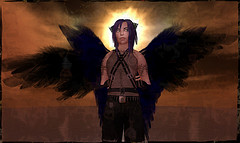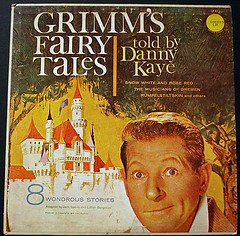5. Solved exercises
Paco: Impossible! I can't get to sleep, I'm too excited. When I flew from the United Kingdom to the USA, the flight lasted seven hours. I was exhausted and couldn't sleep at all.
Man: Well, try to have your mind on a lot of things. Sometimes, it helps. Is this your first visit to South Africa?
Paco: Oh, yes, it is. I won the lottery and decided to travel around the world. I've already been to the United Kingdom and the USA. I am studying History at the University and I'm really interested in knowing new cultures, customs and meeting new people. Anthropology is one of my favourite subjects.
Man: Is it? That's interesting... Was that your first flight?

|
| By Alia and Quot away for a while C. Commons |
Paco: Yes, it was. It was a big British airplane, it seemed safe. However, when it was taking off, I wanted to get off. I suppose it was a panic attack. Some people tried to calm me down, and they got it, but it was one of the worst and most traumatic experiences in my life. I am flying to South Africa because it is safer and faster than any other means of transport.
Man: Yes, it is. Look! I had a fear of flying some years ago, but, because of my job, I had to fly almost every week. I was recommended this fantastic short book entitled Wings of Discovery by Captain Stacey L. Chance. It helped me quite a lot! And remember: There's nothing to fear, but fear itself!
Paco reads...
What if you could fly free like a bird - inherently understanding the wind, the sky, and your own feathered wings? Look into the eyes of an eagle, you will not see fear.
In the conversation, there are some of the main verb tenses you must master in English. Let's identify them paying attention to the form. Identify, first, the Present Simple and the Present Continuous tenses.
| Present Simple |
Present Continuous or Progressive |
| I can't get to sleep |
I am studying History... |
| I'm too excited |
I am flying to South Africa because... |
| it helps |
|
| Is this your first...? | |
| Yes, it is | |
| I'm really interested in... |
|
| Anthropology is one of... | |
| Is it? | |
| That's interesting |
|
| I suppose... |
|
| ... it is safer... | |
| There's nothing to fear... |
|
| Paco reads |
 |
| By hairymuseummatt. C. Commons |
As you can see, most Present Simple tenses refer to habits, routines,
interests or likes and dislikes and the two Present Continuous examples
refer to actions that are happening at the moment of speaking. These
are some of the main uses of these two tenses. Remember how they are
formed!
|
IMPORTANT!!! You should master the Present Simple tense since this will be the tense you will mainly have to use in the opinion essay in Selectividad exam |
Now, let's have a look at the Past Simple tenses in contrast with the Present Simple ones
| Present Simple | Past Simple |
| I can't get to sleep | When I flew... |
| I'm too excited | the flight lasted... |
| it helps | I was exhausted and couldn't sleep |
| Is this your first...? | I won the lottery and decided |
| Yes, it is | Was that your first flight? |
| I'm really interested in... | Yes, it was |
| Anthropology is one of... | It was a big British airplane |
| Is it? | it seemed safe |
| That's interesting | I wanted to get off |
| I suppose... | ...it was a panic attack |
| ... it is safer... | Some people tried to and they got it |
| There's nothing to fear... | ...it was one of... |
| Paco reads | I had a fear of flying... |
| I had to fly... | |
| I was recommended | |
| It helped me quite a lot |
As we will see later in the unit the Past Simple tense is very frequently used to narrate events.
 |
| By estherase. C. Commons |
|
IMPORTANT!!! You should master the Past Simple tense since this will be the tense you will mainly have to use in the narrative essay in Selectividad exam |
Finally, let's notice the Present Continuous tense in contrast with the Past Continuous.
| Present Continuous | Past Continuous |
| I am studying History... | when it was taking off... |
| I am flying to South Africa because... |
Both tenses are formed with the verb to be plus the present participle (-ing) of the main verb. The past continuous is normally used when we want to refer to an action that was in progress at a specific time in the past (When it [the plane] was taking off, I wanted to get off). That is the reason why the past continuous tense is very frequently used with the past simple tense.

|
| By Luminis, Rivka and Noctis. C. Commons |
In English, when we use more than one adjective in attributive position
not only do they go before the noun but they also follow a concrete
order according to type. Have a look at these noun phrases:

|
| By Jacob Whittaker. C. Commons |
a middle-aged American business man
a big British airplane
a fantastic short book
Finally, adjectives are also used to compare people, things and places.
If you want to know how the comparative and the superlative grades of adjectives are formed, you must take into account the number of syllables the adjective has, but this will be studied later in the unit.